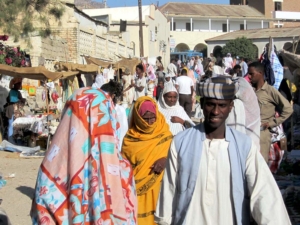Indefinite Instability: Rule of Law in Eritrea


Origins of Corruption
After tasting peace for the first time in three decades, the citizens of Eritrea witnessed the climactic ascent of a guerilla fighter to the nation’s highest office. Isaias Afwerki emerged from the war of independence as the head of the Eritrean People’s Liberation Front, the primary organization that led the fight against Ethiopian rule. Afwerki quickly became the frontrunner to usher the nation into a new age of prosperity that has yet to be realized.
Eritrea declared its independence in a United Nations-supervised referendum on April 23, 1993, and appointed Afwerki as head of state. In the following year, President Afwerki renamed the EPLF to the People’s Front for Democracy and Justice (PFDJ). To this day, the president’s rule of law in Eritrea ensures that the PFDJ remains the nation’s sole political party.
Indefinite Servitude
Almost immediately after taking office, Afwerki’s administration drew international condemnation. Elections originally set for 1997 were indefinitely postponed and the country ratified a constitution but never fully implemented it. Meanwhile, an all-encompassing conscription policy shaped the nation into a militaristic society. Initially, every adult under the age of 55 would serve in the military for 18 months, however, Afwerki revised the policy and extended the length of service for an indefinite amount of time, forcing some Eritreans into decades of military service.
In turn, indefinite conscription has created a workforce with no private sector; as the military and the PFDJ oversee projects in construction, agriculture and government administration. National conscription also ensures a continuous and cheap workforce, with the average salary for conscripts amounting to just 450 Nakfa per month ($30). According to the World Bank Group, 70% of Eritreans live under the poverty line, while Afwerki’s administration allocated an average of 24.9% of the nation’s GDP to military expenditures between 1993 and 2003.
Human Rights Abuses
Rule of law in Eritrea dictates that refusing military service, practicing outlawed religions, forming opposition parties and reporting on the state’s human rights abuses are all punishable offenses. Eritrea maintains a total independent media blackout and ranks dead last out of 180 countries listed in the World Press Freedom Index. The PFDJ holds journalists and other prisoners in deplorable conditions, often leaving them in metal shipping containers in the desert for indefinite amounts of time.
A New Horizon
Ironically, Eritrea’s rule of law for keeping its citizens in check has had the opposite effect, as many citizens decide to flee the country despite the significant risks. As of 2024, there are an estimated 559,000 Eritrean refugees around the world. With roughly 17% of the population having fled the country, there is a great need for refugee assistance organizations like the America Team for Displaced Eritreans (ATDE).
Based out of Pennsylvania, the ATDE is a nonprofit organization that advocates on behalf of Eritrean refugees and asylum seekers around the world. Volunteers with the ATDE assist refugees with housing, asylum case support and connecting with international organizations that are equipped to provide protection and medical assistance to those in need. Additionally, the ATDE lobbies government officials in the United States and abroad to enact positive change in the way Eritrean refugees are treated when seeking better lives for themselves and their families.
Despite the PFDJ’s efforts, the resiliency of the Eritrean people continues to shine brightly, illuminating the possibility of a prosperous future. Additionally, groups like the America Team for Displaced Eritreans continue the important work of advocating on behalf of the victims of Afwerki’s administration. With the world bearing witness and governments being pressured into action, change might be on the horizon for this fledgling nation.
– Burke Bunyard
Burke is based in Austin, TX, USA and focuses on Politics for The Borgen Project.
Photo: Flickr
